|
|
|
Sort Order |
|
|
|
Items / Page
|
|
|
|
|
|
|
| Srl | Item |
| 1 |
ID:
133512
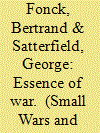

|
|
|
|
|
| Publication |
2014.
|
| Summary/Abstract |
In the late seventeenth century during the Dutch War (1672-1678) and the Nine Years War (1688-1697), French armies relied on small war for the accomplishment of essential tasks and as part of an overall strategy of exhausting their opponents in the Low Countries. The purposes of small war included the imposition of contributions on enemy populations, the destruction of the enemy base of operations, blockades of fortresses, and the general support of campaign armies. The expression 'small war' in the French language appeared with growing frequency in the 1690s. Small war can be viewed as both a cause and consequence of the characteristics of these wars. The limited policy goals of Louis XIV the king of France required a strategy that minimised risk and accomplished the goal of reducing if not eliminating the Spanish presence in the Low Countries that bordered the north of France. As French armies increased in size during this period, the demand for specialists at small increased in order to provide security and ensure supply. Small war in the late seventeenth century was thus not ideologically motivated insurgency, but in the minds of French commanders an essential component of strategy and the nature of war.
|
|
|
|
|
|
|
|
|
|
|
|
|
|
|
|
| 2 |
ID:
133516
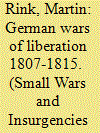

|
|
|
|
|
| Publication |
2014.
|
| Summary/Abstract |
In the Age of Napoleon, 'small wars' and 'revolutionary war' were closely connected. There were, however, different strands of this phenomenon: speaking professionally, conservative officers condemned small wars as an irregular regression to previous less disciplined forms of warfare. The Prussian state continually tried to discipline and regulate spontaneous risings. Yet the irregular character of small wars offered the opportunities for a less complex way of fighting, thus enabling the arming of the 'people' to fight. Individual undertakings, such as Ferdinand von Schill's doomed campaign in 1809, were designed to spark off a general popular uprising. But they were cheered by many and supported by few. Meanwhile, Neidhardt von Gneisenau conceived guerrilla-style Landsturm home-defence forces, which were designed for an irregular people's war. These concepts were put into practice in the 'war of freedom' - or 'war of liberation' - in 1813. Eventually both the mobilisation and the tactics remained regular, however, despite the emphatic appeal to a national 'people's war'.
|
|
|
|
|
|
|
|
|
|
|
|
|
|
|
|
| 3 |
ID:
133515
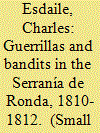

|
|
|
|
|
| Publication |
2014.
|
| Summary/Abstract |
The Spanish Guerrilla (1808-1812) which has given its name to ideologically motivated insurgencies is usually portrayed as a patriotic uprising against the French occupation forces of Napoleon. It was that, in part, but also many other things besides. This case study illustrates its overlap and convergence with banditry but also with social unrest turned into uprisings directed by poor Spaniards against their creditors, as in the storming of Ronda by insurgents in 1810. From the propaganda of the day to the subsequent Spanish patriotic historiography, there has been a tendency to exaggerate the amplitude of events and also the damage that was done to the French forces and the casualty figures inflicted on them.
|
|
|
|
|
|
|
|
|
|
|
|
|
|
|
|
| 4 |
ID:
133513
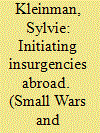

|
|
|
|
|
| Publication |
2014.
|
| Summary/Abstract |
Secret French plans to launch guerrilla-style raids on the British Isles devised in the spring of 1796 were referred to as 'chouanneries'. The name and concept behind these small-war operations were modelled on the irregular tactics used by the Chouan rebels in the Vendée, which the French state army had brutally quashed, but some wished to transfer into their institutional practice. Part of France's ongoing military strategy in the war against Britain, which included fomenting insurrection in Ireland, these irregular operations were to be manned partially by pardoned deserters and released convicts and prisoners of war. Of these, only Tate's brief invasion of Wales in 1797 was realised, but the surviving plans provide insightful historical lessons into an Anglophobic mindset shared by a small network of practitioners and policy deciders on the effectiveness of such shock and awe tactics. Largely motivated by the desire to take revenge for Britain's support of counter-revolutionaries in the Vendée, these plans could more aptly be referred to as counter-'chouanneries'.
|
|
|
|
|
|
|
|
|
|
|
|
|
|
|
|
| 5 |
ID:
133514
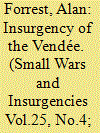

|
|
|
|
|
| Publication |
2014.
|
| Summary/Abstract |
The insurrection in the Vendée combined open warfare with the methods of petite guerre, ambushing French republican soldiers and cutting their supply lines to Paris. These tactics, when combined with the hatreds generated by a civil war, go far to explain to the cruelty of the conflict in the west and the depth of the hatreds it engendered. In republican eyes the use of guerrilla tactics was unjust and illegitimate, and they denounced their adversaries as common criminals and brigands, portraying them as backward, superstitious, even as subhuman, and in the process justified the savage repression they unleashed against them.
|
|
|
|
|
|
|
|
|
|
|
|
|
|
|
|
| 6 |
ID:
133510
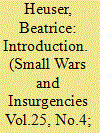

|
|
|
|
|
| Publication |
2014.
|
| Summary/Abstract |
When twentieth-century authors wrote about 'partisan warfare', they usually meant an insurgency or asymmetric military operations conducted against a superior force by small bands of ideologically driven irregular fighters. By contrast, originally (i.e. before the French Revolution) 'partisan' in French, English, and German referred only to the leader of a detachment of special forces (party, partie, Parthey, détachement) which the major European powers used to conduct special operations alongside their regular forces. Such special operations were the classic definition of 'small war' (petite guerre) in the late seventeenth and in the eighteenth centuries. The Spanish word 'la guerrilla', meaning nothing other than 'small war', only acquired an association with rebellion with the Spanish War of Independence against Napoleon. Even after this, however, armies throughout the world have continued to employ special forces. In the late nineteenth century, their operations have still been referred to as prosecuting 'la guerrilla' or 'small war', which existed side by side with, and was often mixed with, 'people's war' or popular uprisings against hated regimes.
|
|
|
|
|
|
|
|
|
|
|
|
|
|
|
|
| 7 |
ID:
133518
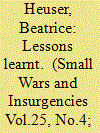

|
|
|
|
|
| Publication |
2014.
|
| Summary/Abstract |
Did participants in small wars in the period 1775-1831 learn from previous or contemporary examples? While this is difficult to prove for participants who left no written records, there is considerable evidence in existing publications by practitioners that they did indeed draw out lessons from recent insurgencies, either from their own experience or from events elsewhere which they studied from afar, especially the Spanish Guerrilla, which had already become legendary. Most authors showed an interest in how to stage insurgencies rather than in how to quell them. Even then, transfer did not come in a package of tactics-cum-values, but in each case in different configurations.
|
|
|
|
|
|
|
|
|
|
|
|
|
|
|
|
| 8 |
ID:
133517
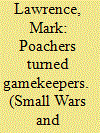

|
|
|
|
|
| Publication |
2014.
|
| Summary/Abstract |
This article modifies the associations made by historians and political scientists of Spanish guerrilla warfare with revolutionary insurgency. First, it explains how the guerrilla phenomenon moved from a Leftist to a reactionary symbol. Second, it compares the insurgency and counter-insurgency features of the Carlist War (1833-1840) with those of the better-known Peninsular War (1808-1814). Third, it shows how erstwhile guerrilla leaders during the Carlist War made their expertise available to the counter-insurgency, in a socio-economic as well as military setting. This article revises the social banditry paradigm in nineteenth-century Spain in the under-researched context of Europe bloodiest nineteenth-century civil war.
|
|
|
|
|
|
|
|
|
|
|
|
|
|
|
|
| 9 |
ID:
133511
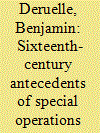

|
|
|
|
|
| Publication |
2014.
|
| Summary/Abstract |
The first conceptual, theoretical treatises about small war (la petite guerre) as special operations appeared only from the middle of the seventeenth century. The term is not used in the eighteenth-century sense of 'special operations' in older sources. The supposed absence of any treatment of the subject is surprising considering the obsession with the 'art of war' in the Renaissance, but other authors attribute it to a supposed antinomy between chivalric ideals and irregular warfare. But the absence of explicit manuals on the subject is not evidence of absence of advanced reflection on this kind of operations in the Middle Ages and in Early Modern times. We should thus look elsewhere, in other genres, for writings that contain and pass on military knowledge. Epics, romances, educational and military treatises, and memoirs in fact contain elements of a theory of special operations, even though these genres differ from our conception of rationality inherited from the Enlightenment.
|
|
|
|
|
|
|
|
|
|
|
|
|
|
|
|
|
|
|
|
|